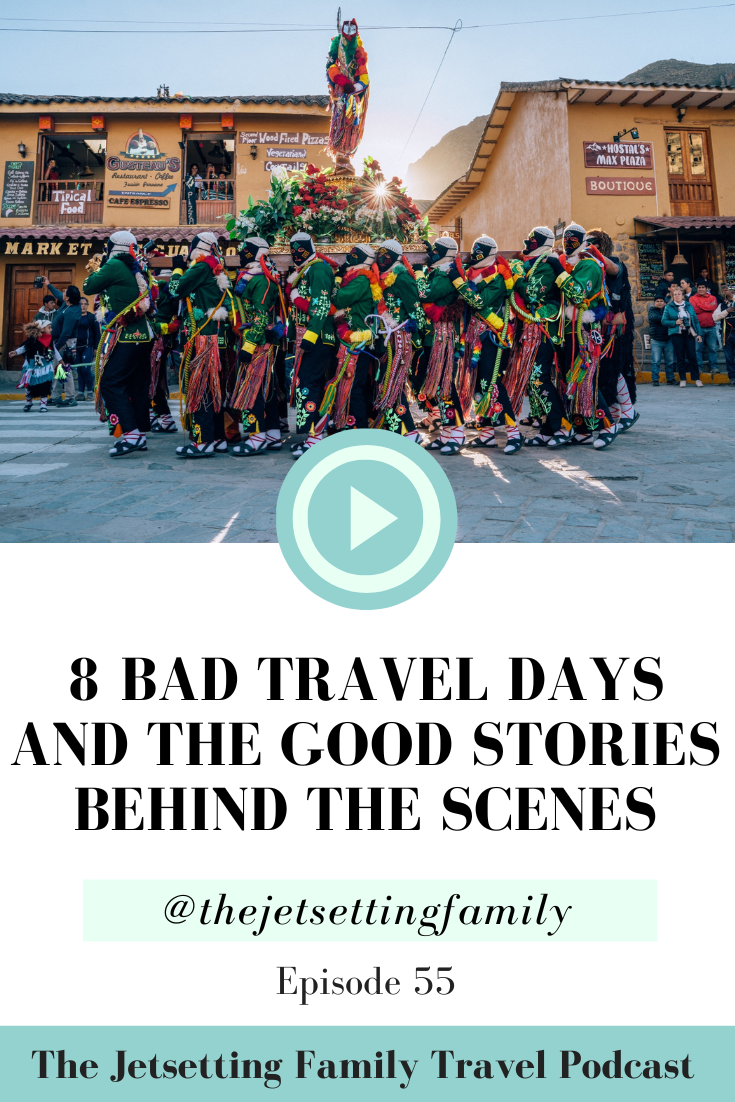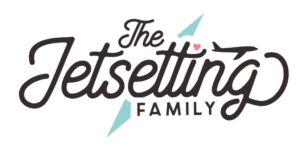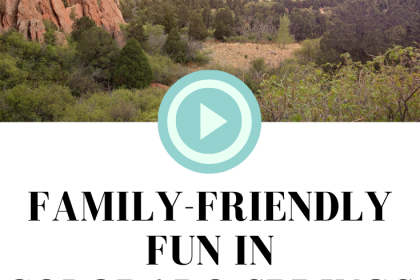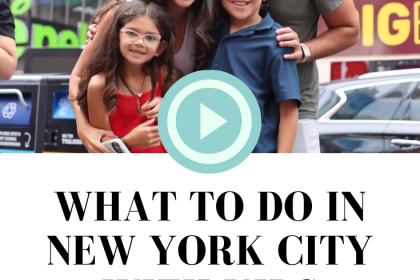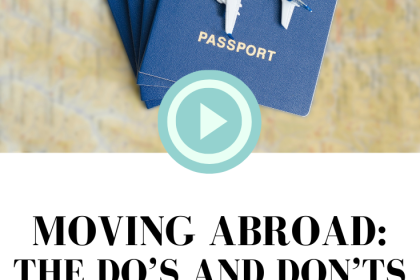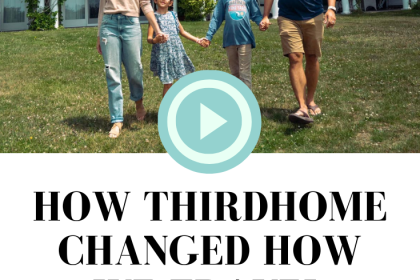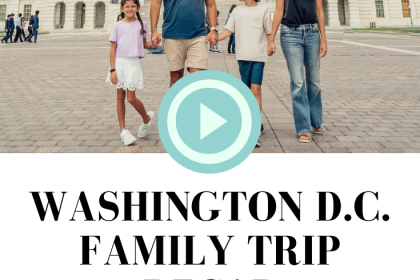The band AJR sang, “100 bad days make 100 good stories. 100 good stories make us interesting at… podcasts?” 😂 Although we love to cover the positive aspects of travel, sometimes a bad travel story is too juicy to pass up. Here are some stories of our travel mishaps and incidents, and the lessons we learned from them!
Listen and Subscribe on: Apple Podcasts, Spotify, Google Podcasts
Transcript
Rod: Welcome to the Jetsetting Family Travel Podcast. I’m Jess. And I’m Rod. And while we usually try to cover the positive aspects of travel, today we are talking about our bad travel days.
Jess: We, I feel like overall we’re very, very fortunate to not have anything catastrophic happen on our travels. But we did have some moments where things just either didn’t go as planned or it was just an awful travel day in general.
And I feel like it’s always good to know the good, the bad, the ugly if you’re planning to full-time travel, because not every day will be perfect.
Rod: Yeah. So we put together these eight stories that we’re going to go one by one. Some of them I don’t, I don’t know if there’s any lessons learned from them, but I, some of them for sure there are.
So without further ado, let’s get started and here comes our first one. This one wasn’t too horrible.
Jess: I don’t know in the moment. It felt bad, but it was, it was like a blessing and a curse all at once. Because I always say when you’re traveling you should research if there’s any local festivals going on, and we did not do that.
Lesson learned. Yeah, so let’s, you should do that.
Rod: So let me, let me fill you in on the situation here. This was 2019. We took a trip to Peru and we actually have a couple of stories about our trip to Peru, which is really interesting and coincidental. But this one in particular was to a town called Ollantaytambo and it’s a very culturally rich Inca archeological site.
And when we showed up there, it was also the weekend of their biggest festival of the year. So a lot of these Inca tribes and Peruvian communities would come to Ollantaytambo and they would perform traditional musical performances. They would get dressed up in a lot of cultural attire. And the festival itself, I thought was pretty cool.
Jess: Yeah, I felt really, really lucky that we got to witness it. I feel like we got to see people from all different areas of kind of that more rural area of Peru come together. We got to witness their parades. We got to see some of their ceremonies, and so overall, I actually am really happy we went during that time because we got to see things that we would’ve never witnessed.
Right. The downfall was, and I don’t know if it was primarily the location we were in, or if it would’ve been the same regardless, but the band that played the music for this whole festival, and this festival’s like three days straight, and when I say three days straight, it’s not like it’s eight to four.
It’s like a 24-hour full, 24 hours full on event for three days. So it’s like a three day. All-day, all-night event. And the band that played the performance, their practice area was directly outside our window.
Rod: For our Airbnb. So while we were trying to get to bed at like what, 10, [11:00] PM all that we could hear right outside of our window was the sound of drums.
And flutes and maybe some guitars, but it was a sound that just repeated over and over and over. And yes, there’d be little breaks here and there, but I don’t know if they brought like other bands to come in and perform in this area. It was just like tented area that was in the street. And there was just constant music at the same tone, with the same sounds over and over.
Jess: And yeah, I think had it been like a concert where there were like different songs being played, it wouldn’t have like driven me as crazy. But it was the same song for three days straight. 24 hours a day. Like it started to just be like, this song is going to haunt me in my dreams for the rest of my life.
Like it was. So, it’s hard to describe because it’s like, oh, it’s just a music. But it sounded like the trumpet player was in my ear playing this song. Yep.
Rod: Oh my gosh. It was just, they would just repeat over and over and over again.
Jess: Over and over. And the kids couldn’t sleep because it was so loud and. I mean it was just rough and I, I don’t know because the town is really small and it’s really beautiful and if you can go to Ollantaytambo you should definitely go.
But I don’t know if it would’ve been any quieter because like these parades processed through this town. Had we been elsewhere, I do think we were at. I don’t know. It was negative That we’re staging. Yeah, were at like their practice. Like I think the bands would come in and practice to follow their little group and they were like right there.
And the thing was is, I don’t know, we’re pretty cheap, so I don’t know if we would’ve looked into changing hotels, but the reality was is everything in that town was going to be booked because that weekend, yeah, it was a festival weekend. We were lucky to even have a place to stay. So we kind of just knew like.
We had to just suck it up.
Rod: Yep. So we did. We lost some sleep over it, but still had a good time in Ollantaytambo and eventually made it to Machu Picchu from the Inca Rail train there. So overall positive experience, lesson learned. Look into when festivals are happening and I don’t know if there’s a way to really be able to tell if you’re going to be directly affected by it, but just at least have awareness that that’s happening.
Jess: Yeah, because that, I mean, no sleep for three days was rough, especially because it was like a long flight getting there. We were trying to adjust to the altitude and just like none of us could sleep. Right, right. But another Peru story is after going to Machu Picchu, we ended up going to Cusco, which a beautiful city.
I actually would love to go back and explore. Oh yeah. More. I feel like we didn’t have enough time there. The architecture was wonderful. Peru’s really well known for their food. Just a lot to see. Something to know in Peru. One, the altitude guys is game changer. So. We didn’t get sick. Thankfully, none of us got sick.
The kids were rock stars. Rod and I were great. But you feel it.
Rod: Yeah. It’s like what, 12,000 feet high.
Jess: Yeah. So like, if you’re going to try to run or something, or you’re going to hike, you’re going to feel fatigue and exhaustion. Well, we didn’t realize one. Our Airbnb in Cusco, something that we always preach now.
Always, always ask what floor you’re on, and if it’s a high-up floor, is there an elevator. Lesson learned?
Rod: Yep. In this situation, we arrived at our Airbnb. It was an apartment building. I. And we realized it was on the fifth floor with no elevator. So here we are with our three full luggages, all of our backpacks.
Tired kids trying to get up five sets of stairs to get up to our apartment and, oh man, that was, that was rough. I, I think I felt like I was in pretty good shape, but trying to haul all of this luggage up to the fifth floor was, really, really difficult. It was so bad. I was out of breath after the first one.
I was like, Ooh, I have to go do this four more times, or whatever.
Jess: Well, it was funny because we’re like, okay, well we made it up here. Awesome. You know, it won’t be that bad now. Like we, we’ll just spend a couple days here. We don’t have to carry the luggage up and down when we’re coming in and out. And on the last day it’s at least downhill.
Well, on the last morning, I’ll never forget, like Rod is the one who gets up early and wants everything packed and ready. And I am kind of like, we’ll somehow make it and. It drives Rod crazy because I am very laid back in the morning. Oh, we in, I’m in the last minute possible. I’m always like, oh, it’ll be fine.
And Rod’s like, get it together. Well anyway, so Rod’s organizing bags, getting everything ready and I look out the window and I was just like, oh crap. Because there was some random market, which probably would’ve been, it’s like a Saturday market. Really, really cool. Had we not been trying to catch a flight, but like I look out the window and look as far left as I can look and as far right as I can look, and this market just seemed to be going for miles and it was like blocking the entire street.
So like the taxi, who was going to pick us up out front? There was no way they were going to come in, I don’t know, even eight blocks of us, right? Because it was just dense tents taking up this entire street. So I’m looking and I’m like, oh no. I have to tell Rod that he has to not only get all of our luggage down, which I was happy to help, but this luggage was really heavy.
Yep. But now we have to carry the two kids through. I mean, it was the most chaotic market. It didn’t seem like it was a touristy market. It seemed like a local market. There was like a lot of produce. There was a lot of like used shoes even it seems like, I don’t know, they just had a lot of stuff being sold.
A lot of locals were there and I would’ve loved to peruse it, but we were kind of like, we needed an extra hour probably to be able to get to this taxi cab because getting the kids and the luggage and Rod and I weaving through, I mean like the tightest spaces you can imagine for like blocks and blocks and blocks and blocks to try to get to a clearing to get a cab was rough.
Rod: Right? That was, that was so rough. Uh, shoulder to shoulder traffic weaving in and out. Thankfully we did find a taxi eventually that stopped and took us to the airport. We did not miss that flight. But the story continues.
Jess: I don’t know why Peru has Yeah. That,
Rod: that was a pretty, I don’t know if it was a nightmare day, we made it through it,
Jess: But that was one of our tougher travel days.
I mean, we’ve had worse things happen on our travels. We’re going to keep going down the list, but right. So next, on this trip, so we make it to the airport
Rod: and Yeah, and we are, we are flying from Cusco to Lima, having a short layover in Lima, and then we are going from there to Reno, Nevada. Through Dallas? I think so.
It was a really long trip. Anyway, it was
Jess: going to be like an 18-hour day or something. Ridiculous. Yeah. So we left
Rod: the Cusco at like [5:00] PM We arrived in Lima. Our flight in Lima to Dallas was at midnight because it was a red eye. So we, we made it there without incident. We got to the airplane. Got all checked in, seated in time for the flight at midnight.
And usually what we do with the kids, especially on our red eye, is we’ll give them a natural melatonin. That way they can sleep better and then they can wake up refreshed once we, you know, go get in the ground in Dallas. So we gave them their melatonin, the kids fell asleep, and we start to drift off to sleep as well.
So midnight hits. That we got a note from the pilot that they’re looking into some issue and, you know, hopefully they’ll be taking off within the next hour. And it’s like, all right, well let’s just go to go to sleep and hopefully by the time we wake up, we’ll be in the air so everyone’s sleeping.
Then we get another notification at two o’clock. Hey, we’re still working on this. This is a maintenance issue that we’re having people to come in from because it was [2:00] AM. And you know, the, the maintainers were coming over to take a look at it.
Jess: Like [3:00] AM They’re finally like, everyone needs to get off this plane.
And I’m like, okay. Now my kids are exhausted because we gave them melatonin at the wake. We are exhausted at [3:00] AM because we just had this crazy travel day of going, I don’t know, just getting to the airport in Cusco. We flew to Lima. And then it gets worse because then they’re like, everyone needs to turn in their passports.
And I’m like, what?
Rod: Yeah. So the reason why is because we checked out of Peru through immigration. When we got into the international terminal, we got our passport stamped and everything. So since we, there was no other flight for us until probably the next day, we had to reprocess through immigration. They had to bring somebody because immigration was already closed to admit us back into Peru.
And then we had to get into a line to rebook our flights.
Jess: Oh my gosh. Guys, I think between like getting off the plane, we have two exhausted kids. They give you all of your luggage back because you have to go through customs. It took us like an hour and a half probably to get through immigration and customs and then we’re like, oh my gosh, I’ll just get to a hotel.
And then we just see the endlessly long line to rebook our flight. And I just wanted to cry at this point, like we’re carrying the kids, like, we’re like, I don’t know, I, we just get to that point where I rarely do this when I travel, but when I’m so exhausted, I just am like at my wits end. I have no patience left.
And I remember thankfully, and I try never to pull this card because I don’t think people who travel with kids deserve like a zillion perks. But due to the fact that Peru is so high altitude, there were very few children on this period. It was us and another family. Family. I think they had three kids. Yeah.
So it was two families with kids. And I remember looking at this long line, we’d waited like an hour already. And I finally went to the front and I said, look, I rarely ask for this, but there are two families with kids here and I’m pretty sure, maybe it’s wrong of me to think, but like 40-year-old adults can hold it together better than these two and three and four year old kids.
Like, can you just prioritize us and get us a hotel? And thankfully they did. They pulled us and the other family aside and they got us a hotel. But even with me asking and advocating for the kids to do this, which I kind of felt bad about, because there was a lot of people, we probably cut. We didn’t get to a hotel till seven 30 in the morning.
Yep. So we like boarded the flight. At, I think it was like [11:00] PM. And we are pulling into a hotel at [7:30] AM and haven’t left the city like it was so frustrating.
Rod: And on top of that, it was Father’s Day Sunday now. So we got to spend that Father’s Day. We slept from what, [7:30] AM until [4:00] PM Oh my gosh.
It was, so when we have to check out of that hotel again. And, and good. Do it all over then do it all over again to took, to take the next midnight flight over on another red eye to get to Dallas and then to Reno. But we eventually made it.
Jess: And it was hard because we, in Reno, we had a job, a big job for us.
It was, yeah, tourism, tourism board with travel Nevada tourism boards for content creators pay really well, but they’re really important jobs. You want to make a good impression. And I had planned to fly, thank God, to travel Nevada, to have one day for the. All of us to rest before the job started. And now it was like a ticking time.
Like we have to get there for this job to start. But we started that job exhausted. Thankfully. I still think we did a great job, but I remember getting to Reno, like we got off the plane and we’re like, our first meeting’s in like an hour. Oh my God. I just wanted, that was rough. It was rough, but
Rod: I think adrenaline pulled us through just because we got to do a road trip there.
It was super cool.
Jess: It was amazing. I’d love to go back and work for Nevada again.
Rod: Yeah. Speaking of Content jobs. Our next story here takes place in Berlin. We were hosted, I think we’ve talked about this before. We have, yeah. We were hosted by the Grand Hyatt in Berlin, and this wasn’t a regular like collaboration.
They put us in this three-bedroom suite. In downtown Berlin, extremely beautiful area. And we were to take pictures not just of the hotel room in the suite, but also of our adventures in Berlin that they can use in their marketing material.
Jess: And this suite guys was one of those jaw dropping ones. We were like, pinch me.
I can’t believe we have this. It was like this penthouse amazingness that was probably several thousand a night. Oh yeah. Super, super nice. And we felt like kings and queens and we’re like living this like. Like, I don’t know, was like excitement. Yeah.
Rod: Until, yeah. So this was a three nights stay. We got there at night, first night, stayed there.
Second day, we took all day exploring Berlin. We went to different museums, different tours. We went walking around, took a ton of pictures, and this was probably at like [6:00] PM. We took a taxi back from wherever we were having dinner to the hotel. And as soon as I get out, you know, the kids were getting them out.
I can’t remember if we had a stroller that we’re getting out and everything. And as soon as I see the taxi pulling away, and we’re starting to walk into the lobby, I’m like, Jess, Do you have our camera? Is it in the backpack? And it’s like, I don’t have our camera. Jess is like, Nope, I don’t have the camera.
So we’re like, oh my gosh guys. Because we were reviewing the pictures that we had taken in the taxi and we just left it on the seat there.
Jess: Oh my gosh. I think my heart sank because I was, in my head, I’m thinking, we’ve lost every photo for this job. We now don’t have a camera. Cause at the time we didn’t travel with the backup camera.
So I can’t even complete the job, and if we don’t get this camera back, I’m now going to owe this hotel for this suite we’ve stayed in that we can’t afford. I mean, yep. It would’ve been probably, it’s like $2,000 a night. So I would’ve owed them 6,000. Plus had to find money to buy a new camera, and I mean, I literally sat in this gorgeous suite that I was so excited to have, and I, one of the few times on the trip, I just sat on the floor and cried.
I was like, I don’t know. We don’t have the money to do this. And Rod was like researching like, where could we buy a new Sony camera? Because Rod’s whole thing was like, if, okay, if we just spend $3,000 on a new camera, we have one more day. We have one day to try to get everything done. So at least we deliver the pictures and don’t owe for the hotel.
I don’t know. It was a hot mess.
Rod: And yeah, we, we kind of lucked out too, because there was a Sony store across the street, street from us. It was already closed that night, so we couldn’t buy it that night. So that whole night we spent talking to the concierge, calling every taxi dispatch line that we could.
We filed a police report. We essentially like went to lost and found at the train station.
Jess: I remember begging the concierge. I’m like, can you downgrade us to your cheapest room? Like I can only afford your cheapest room. And now I have to try to maybe pay for the suite for two nights. Like I don’t want to sleep in the suite another night.
And they were like, no, just stay there. It’s all going to work out. And I’m like, I don’t know.
Rod: Right. Yeah. So we went to bed like so nervous and anxious that night. And when we woke up, I think the, the Sony store opened at like [9:00] AM so it’s [9:00] AM I’m like, all right. Haven’t heard any news from anybody downstairs or from anybody that we called and left messages to.
So I might as well go and like, get ready to, to go to the Sony store and buy a new camera so we can get our day going. And as soon as I’m getting ready to walk downstairs. We get a phone call to the room and it’s the concierge. And he said, hey, somebody came to drop off your camera. It is right here for you, ready to pick up.
Oh man. And we’re like…
Jess: and the funny part was, I mean, I didn’t care at this point. I was so excited. I was so overjoyed. That like all of a sudden, everyone that worked in that lobby was like, I was the one who contacted and got it here. So like Rod’s just like tipping everyone in that lobby.
He’s like, I don’t even care. I think
Rod: We tipped what, like $500 to the different people involved because they were up helping us from security reviewing camera footage to see which taxi might have been to the two different concierge, gosh, staff on different shifts. That we’re trying.
So yeah, we did lose out on some money, but at least we had our camera back. All the pictures were still in there,
Jess: So lesson learned, we have to do it. Ever since this moment, guys, I try so hard every single day. If I take content for a brand, I try to back it up before I go to bed so that at least it’s on my computer.
Yeah, if, if the camera drops in, water gets lost, whatever, I have it somewhere else. And I think now since air tags are so popular, I’m actually going to air tag my camera just so that I have that because a camera is very expensive. Yeah. We have ours now as insured through insurance. Because for us it’s like a huge thing we have to have for our business.
But still, that takes time to process. And when you’re on a job and you’re in the moment, you don’t have time to file a claim and go through the whole process, so Right. Yeah, it was stressful.
Rod: Yep. Stressful. Thinking about more stress. Our next story with it’s two sets of stories, let
Jess: Santi and Yeah. So we, I had been in contact with a family on Instagram called Backyard Travel Family.
If you don’t follow them, you should. They’re New Zealand experts. They’re incredible. And they live on a farm, on a dairy farm, and they invited us to stay with them. And I always love when locals host us. So I was so excited I was going to get to spend time with someone I felt like I had built a friendship with online.
We were going to go stay. No, they weren’t evil and murder us. I’m just kidding. They were amazing people. So, so kind, so, so loving. But quickly after getting there, Santi who has asthma but didn’t really struggle at all during our trip. Starts having like really bad asthma flareups and like they live pretty remote and we didn’t rent a car.
Like they were nice enough to pick us up. So I kind of felt awful because there was a point at the nighttime where I finally told Rod like, he needs to go to the hospital. Like, I don’t know, I don’t feel comfortable with him going to bed. And I, for those who know me in real life, no. I am very calm and don’t worry about anything until it comes to medical stuff.
And then I panic. I’m a very anxious person medically, and I could tell Rod at the time was like, I think he’s probably fine. And I’m like, no, we’re not going to bed. He’s going to the hospital. So I felt bad. I had to ask them to take us to the hospital cause we didn’t have a car. Which wasn’t close. It was like 30 minutes.
Right? 30-minute drive. Yeah. So we drive him to the hospital and I honestly think, like in the US they’re going to give him a steroid. Cause we’ve had this happen before. Not often, but it’s like they’re going to give him a steroid. They’re going to, you know, maybe put him on a nebulizer. We’ll be good to go.
We’ll be home in an hour. We get there and the lady literally looks at me and Santi progressively got worse on the drive to the hospital where I was starting to get nervous. And the lady looks at me and she’s like, if we can’t get his asthma under control in the next 30 minutes, we’re going to have to ambulance you to Christchurch.
Yeah. And I’m like, oh crap. Like I, I am normally very paranoid. I didn’t realize we were at that point. And, thankfully that didn’t happen, but we did have to stay overnight. They made us stay overnight and so I felt bad because like their family’s driving back to the farm. And then in the morning I, I don’t know, I felt like we were being such an inconvenience, but they were so sweet about it.
So all of this is going down with Santi. So we’re at the hospital, he’s having breathing problems, they’re getting it under control. And like that next morning they, they told us at the hospital, actually, you cannot go stay back on the farm. Like he’s obviously very allergic to something. Comes to find out Santi’s severely allergic to horses.
And I think that he’s also severely allergic cow to cows. Cow. Yeah. And so since we’re on a dairy farm with all these cows, like he just couldn’t handle it. But anyway, so we get back to their house and I’m sadly like I am really sorry, we can no longer stay here. Not because we don’t like you guys. You guys are amazing.
But like Santi can’t survive on this farm. And so then they’re taking us to Christchurch to drop us off. We get a hotel downtown and literally as we’re checking into this hotel, my dad calls from the US and he’s like, you need to fly home. And I’m like, what are you talking about? Like, life is good here.
We’re loving New Zealand. Right. And he’s like, they’re about to close the US border. This like, COVID i’s gotten outta control and you need to fly home. And I’m like, well, I just got outta the hospital. No one brought up Covid. I think, I don’t know, I’m not that worried. And he is like, no, you really need to fly home.
And so I think it was the next day.
Rod: Yeah, the next day, that’s when the news started to break of like, oh, the US is considering closing the border says this March of 2020. Right. So that’s when we really, because after that we were going to fly from New Zealand to Hawaii. After spending a few more days in New Zealand and then from Hawaii eventually make it back to, to New Mexico and Colorado.
Jess: So this was like the week that Tom Cruise had Covid? No, it wasn’t cruise. Tom Hank had Covid because he had flown Australia and we were talking to the flight attendant from his hotel or from his flight and she’s like, oh yeah, I was Tom Hank’s flight attendant. And then he got diagnosed with Covid and we were all kinda like, oh, okay, like, and then,
Rod: yeah, so we ended up having to change all of our flights.
We took one of the last flights from New Zealand to Sydney. It was empty. Sydney to San Francisco. San Francisco to Albuquerque, New Mexico.
Jess: But on this flight ended up being another one of our most stressful travel moments because when we flew, even when we flew from Thailand to Sydney, like weeks prior, there was a huge health screening.
They checked our temperature. People were like in hazmat suits. It was this whole thing. And they were very clear, like you couldn’t be sick entering the country. We’re like, okay, great. We were fine. So we were expecting the same protocols going back. We experienced that New Zealand to Sydney. Yep.
Well, Sydney to San Francisco was the first time ever that Nora starts throwing up on the plane. Yeah.
Rod: She’s like, my tummy hurts. Oh, and this was in the last, what, two hours of the flight? So we’re like, oh no.
Jess: Oh gosh. I remember like telling the flight attendant, I said, ma’am, I don’t know what to do. My kid’s throwing up, I don’t know if that’s a sign of Covid.
I don’t think so. But we’re about to get off and go through this health screening. Like do we need to stay on the plane? I don’t want to risk getting anyone else sick, but like, what is the protocol here? And I’m texting my dad the second we land and I’m like, dad, I don’t know if we’re going to make it to New Mexico because I think we’re going to be quarantined here in San Francisco.
That literally was our thought. Yeah. We were trying to, like in my head, I’m thinking if. If they only let one adult, like what are we going to do? Would Rod and Santi fly home? And I’d stay with Nora, are they going to quarantine all of us? Like what’s going to happen? And we get off in San Francisco and not one mention of…
Rod: Yeah, even the flight attendant, it’s like, oh, here’s some vomit bags. No worries. Kids get sick on flights all the time. Let’s get off.
Jess: And then I’m like, okay, well this lady’s not concerned. So I go through immigration and customs and I kept waiting for the moment where they’re like, is something wrong?
I’m like, no. No one asked. We weren’t asked. Any health questions. Right. No mention of covid was brought up, which was so shocking because even in Australia they made you so like, gave you these like pamphlets that’s like if you get sick, do not go to a hospital or a doctor, call a number and someone will come to you.
So I’m like, what is happening? But I was so convinced on that flight with Nora throwing up the last leg during the pandemic. I’m like, we are going to get quarantine somewhere. Right? And so then it was a fear of do we go stay at my parents’ house or do we get an Airbnb? Do we quarantine when we get home?
So I don’t know. That whole week I’m sure not just for us, for the whole world was so stressful. But for us, I just feel like with Santi being in the hospital that week and trying to make it home and the kid’s sick, I was like, oh…
Rod: oh, we were a wreck getting back. We, thankfully we had a home with Jess’s parents who took us in and we were able to quarantine there and really take that time to like rest and recover from the hectic New Zealand adventure that we had.
But it was rough. Yeah. We’ll do one more story. And this one happened post Covid is was in 2021 and it is about the first and only time that we have missed a flight. It’s probably my fault. We, I pride myself on like, if there’s anything, I will make sure that we arrive to our flight on time so that we don’t miss it.
I mean, we have had flights canceled and delayed on us. But those weren’t our fault. This one was our fault because we could have arrived earlier. So what was, what happened was we were driving from Naples, in Florida to get to Miami, to fly to The Bahamas. So we had to drive an hour, get to the airport, park the car, and do all that stuff.
And this was in 2021 where it’s still, there were still Covid protocols had to mask up in the airport and everything. So as we were driving in, Jess and I were talking like, all right. In terms of getting lunch, we’re starting to cut it pretty close. We were, I think within two hours of our flight time.
So then we were thinking, all right, my idea was like, okay, let’s just eat at the airport, find something quick there. But since it was like we check into our flight,
Jess: It was still during covid and like there were like tons of masking. I didn’t know how everything was going to work out. I was like, I don’t want to be on this plane with food.
And then we’re supposed to have our masks on. So I was like, no, we need to stop at a drive-through. Yep. Stop at a drive-through. The kids can eat quickly on the way to the airport. It’ll be super-fast.
Rod: Yep. So we go to this drive-through and the drive-through line, even though it wasn’t a long line, the, for some reason it took them forever to make the food and
Jess: We were like stuck. The way it was, the drive-through was barricaded. Like we kind of knew like, we need to get out of this line. We need to go out. Yeah, we a car in front of us and a car behind us. And it was like we couldn’t get out and we were just like, oh my gosh, we’re stuck here.
Rod: Yeah. So we showed up to the airport.
We went and hurried through to the line for American Airlines. And it was still about an hour until our flight took off. So we’re, but we got, we got enough time. We have TSA precheck. We should be able to get through security pretty easily, so we won’t miss the flight.
Jess: It was our fault for not being earlier, but it didn’t help that when we got to the counter, we got like, a sloth of a, an employee like this, this person moves slower than I could ever imagine in my life.
And we really messed up because normally we get free luggage because Rod’s military. And so we were asking about the free luggage, and she’s like, oh, I need to go check on that. Let me ask. So she walks away very slowly, very slowly. She takes like 10 minutes to verify that she can give us free luggage.
And then when she comes back, she just goes, Oh no, it’s now one minute past the time. I can check you in. You’ve now missed your flight. And I’m like, had I known that there was that much urgency, I would’ve just paid for the bags and gone, right? Like I didn’t know.
Rod: Yeah. So we understand the rule that, you know, for international flights you have to check your luggage at least one hour in advance.
And we had arrived with what? One hour and five minutes, which was our fault. Yeah. By the, was our fault. By the time, yeah. We should have gotten in more time. By the time that it was actually time to check the luggage, then it was too late. We even asked to see a supervisor to see if they could make an exception.
There were no exceptions. So thankfully silver lining to this, they were able to rebook us on a flight. So we only arrived two hours late. Yeah. We were able to check our luggage there. We flew, standby on that one actually. Oh, we got lucky. So we checked in our luggage, right. We sat at the gate hoping that there would be enough space for us to, to get on, and thankfully we did.
But, lesson learned, give yourself more time, especially, especially for international flights, which maybe I, I don’t know. That was our first international flight in a while. Really, once Covid had started.
Jess: Right. So, but there’s other things we haven’t talked about. We’ll have to have round two episodes. Right.
There was…
Rod: Well, don’t spoil it yet. Yeah. We’ll just spoil save it for another episode. There was
Jess: Some, I think even some more epic ones that I don’t know why are all coming to my mind at this very moment. Yeah. That I’m like, ah.
Rod: Yep. So part two will be coming soon. If you guys
Jess: like this episode, right, let us know. Part two actually might be more juicy now that I think about it.
Rod: Oh, interesting. All right. Well, you know, if you enjoyed this episode, let us know. As always, feel free to reach out to us: [email protected], or @thejetsettingfamily on Instagram. If you enjoy this episode too, make sure to subscribe.
That way you get each of the episodes coming every Tuesday to your phone or wherever it is that you listen to your podcasts. Thanks again for being our listeners and for yes, allowing us to share our fun travel stories, whether they’re good or bad. So, until next time, Happy Jetsetting!
